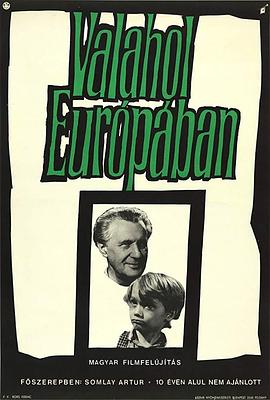Somewhere in the remote region, the war ends. In the midst of ruined cities and houses in the streets, in rural hamlets, everywhere where people still live, are children who have lost their homes and parents. Abandoned, hungry, and in rags, defenseless and humiliated, they wander through the world. Hunger drives them. Little streams of orphans merge into a river which rushes forward and submerges everything in its path. The children do not know any feeling; they know only the world of their enemies. They fight, steal, struggle for a mouthful of food, and violence is merely a means to get it. A gang led by Cahoun finds a refuge in an abandoned castle and encounters an old composer who has voluntarily retired into solitude from a world of hatred, treason, and crime. How can they find a common ground, how can they become mutual friends The castle becomes their hiding place but possibly it will also be their first home which they may organize and must defend. But even for this, the price will be very high. To this simple story, the journalist, writer, poet, scriptwriter, movie director, and film theoretician Béla Balázs applied many years of experience. He and the director Géza Radványi created a work which opened a new postwar chapter in Hungarian film. Surprisingly, this film has not lost any of its impact over the years, especially on a profound philosophical level. That is to say, it is not merely a movie about war; it is not important in what location and in what period of time it takes place. It is a story outside of time about the joyless fate of children who pay dearly for the cruel war games of adults. At the time it was premiered, the movie was enthusiastically received by the critics. The main roles were taken by streetwise boys of a children's group who created their roles improvisationally in close contact with a few professional actors, and in the children's acting their own fresh experience of war's turmoil appears to be reflected. At the same time, their performance fits admirably into the mosaic of a very complex movie language. Balázs's influence revealed itself, above all, in the introductory sequences an air raid on an amusement park, seen in a montage of dramatic situations evoking the last spasms of war, where, undoubtedly, we discern the influence of classical Soviet cinematography. Shooting, the boy's escape, the locomotive's wheels, the shadows of soldiers with submachine guns, the sound of a whistle—the images are linked together in abrupt sequences in which varying shots and expressive sharp sounds are emphasized. A perfectly planned screenplay avoided all elements of sentimentality, time-worn stereotypes of wronged children, romanticism and cheap simplification. The authors succeeded in bridging the perilous dramatic abyss of the metamorphosis of a children's community. Their telling of the story (the scene of pillaging, the assault on the castle, etc) independently introduced some neorealist elements which, at that time, were being propagated in Italy by De Sica, Rossellini, and other film artists. The rebukes of contemporary critics, who called attention to formalism for its own sake have been forgotten. The masterly art of cameraman Barnabás Hegyi gives vitality to the poetic images. His angle shots of the children, his composition of scenes in the castle interior, are a living document of the times, and underline the atmosphere and the characters of the protagonists. The success of the picture was also enhanced by the musical art of composer Dénes Buday who, in tense situations, inserted the theme of the Marseilaise into the movie's structure, as a motive of community unification, as an expression of friendship and the possibility of understanding. Valahol Europaban is the first significant postwar Hungarian film. It originated in a relaxed atmosphere, replete with joy and euphoria, and it includes these elements in order to demonstrate the strength of humanism, tolerance, and friendship. It represents a general condemnation of war anywhere in the world, in any form.
关联推荐
猜你喜欢
 9.0更新至04集花泽香菜 土屋神叶 中村悠一 杉田智和 佐仓绫音 日笠阳子 园崎未惠 渡辺 紘 辻井健吾 栗坂南美 松田健一郎 诸星堇 畠中祐 斋贺光希 三宅健太 22 岁的软件开发者萨姆·杨自幼便是狂热的游戏爱好者。学生时代全身心投入游戏开发,终于推出了酝酿已久的冒险解谜游戏《Luminate》!然而,当超人气游戏主播马歇尔·劳给出恶评后,她作为游戏开发者的前
9.0更新至04集花泽香菜 土屋神叶 中村悠一 杉田智和 佐仓绫音 日笠阳子 园崎未惠 渡辺 紘 辻井健吾 栗坂南美 松田健一郎 诸星堇 畠中祐 斋贺光希 三宅健太 22 岁的软件开发者萨姆·杨自幼便是狂热的游戏爱好者。学生时代全身心投入游戏开发,终于推出了酝酿已久的冒险解谜游戏《Luminate》!然而,当超人气游戏主播马歇尔·劳给出恶评后,她作为游戏开发者的前  2.0更新至07集藤新 李兰陵 常蓉珊 林帽帽 叶知秋 臭名远扬的圣手牧天侯突遭暗算,引发江湖震动。两位正直弟子郑东霆和祖悲秋(废柴兄弟)因此相识,为帮师弟祖悲秋找寻十年未见的妻子,也为找寻杀害师父的真凶,一个名捕头和一个富二代阴差阳错的组合共闯江湖,踏上
2.0更新至07集藤新 李兰陵 常蓉珊 林帽帽 叶知秋 臭名远扬的圣手牧天侯突遭暗算,引发江湖震动。两位正直弟子郑东霆和祖悲秋(废柴兄弟)因此相识,为帮师弟祖悲秋找寻十年未见的妻子,也为找寻杀害师父的真凶,一个名捕头和一个富二代阴差阳错的组合共闯江湖,踏上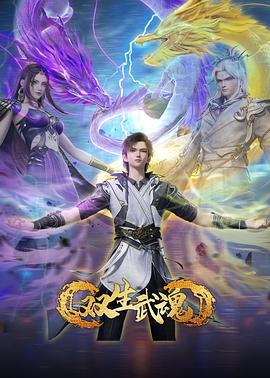 1.0更新至36集王秋皓 刘曼 李敏 大鲲 楚越 乔苏 余昌宇 大林郡世家出身的林凡本是得到天骄令的绝世天才,却被未婚妻夺走武魂,沦为废物。当来历莫测的大魔寄生林凡身上,重新激活了他被废的武魂,使他成为稀有的双武魂体质,至此,林凡正式踏上崛起之路,从小小郡城,闯上
1.0更新至36集王秋皓 刘曼 李敏 大鲲 楚越 乔苏 余昌宇 大林郡世家出身的林凡本是得到天骄令的绝世天才,却被未婚妻夺走武魂,沦为废物。当来历莫测的大魔寄生林凡身上,重新激活了他被废的武魂,使他成为稀有的双武魂体质,至此,林凡正式踏上崛起之路,从小小郡城,闯上 9.0更新至129集未知 陈岛来到浩元大陆,发现自己竟是个零天赋的修行废材,好在觉醒了能改变时间的金手指。他本想利用改变万物时间的能力,暗中成长。然而随着家族内斗的爆发,身为少主的他自然无法置身事外。
9.0更新至129集未知 陈岛来到浩元大陆,发现自己竟是个零天赋的修行废材,好在觉醒了能改变时间的金手指。他本想利用改变万物时间的能力,暗中成长。然而随着家族内斗的爆发,身为少主的他自然无法置身事外。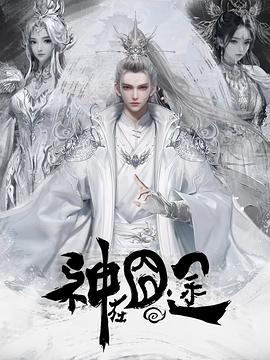 6.0更新至11集未知 神尊意外坠入凡界,法力尽失。只因他破解飞升奥秘千年,不料第一步竟是化仙为凡,重头再来!神尊本想效仿其他修士,自此投入苦兮兮的修炼,谁曾想一个从天而降的厨娘,意外开启他“吃着也能升级”的新道路。自小以灵
6.0更新至11集未知 神尊意外坠入凡界,法力尽失。只因他破解飞升奥秘千年,不料第一步竟是化仙为凡,重头再来!神尊本想效仿其他修士,自此投入苦兮兮的修炼,谁曾想一个从天而降的厨娘,意外开启他“吃着也能升级”的新道路。自小以灵 10.0更新至23集未知 山野少年江寒为寻父母踏上修真路,意外激活母亲遗留之物天兽鼎,觉醒无上神通!从此逆天改命!战天斗地!在诸神陨落的战场上血战万族,以凡躯杀出一条通天之路!誓为人族搏一个煌煌未来!
10.0更新至23集未知 山野少年江寒为寻父母踏上修真路,意外激活母亲遗留之物天兽鼎,觉醒无上神通!从此逆天改命!战天斗地!在诸神陨落的战场上血战万族,以凡躯杀出一条通天之路!誓为人族搏一个煌煌未来!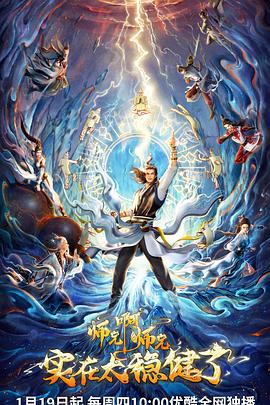 8.0更新至112集未知 身患绝症的年轻人李长寿,意外重生在封神大战之前的上古时代,成了一个炼气士。为了修得长生不老且能在残酷的洪荒安身立命,他低调行事,凡事谋而后动,从不轻易步入危险之中,藏底牌,修遁术,炼丹毒,直到有一天,
8.0更新至112集未知 身患绝症的年轻人李长寿,意外重生在封神大战之前的上古时代,成了一个炼气士。为了修得长生不老且能在残酷的洪荒安身立命,他低调行事,凡事谋而后动,从不轻易步入危险之中,藏底牌,修遁术,炼丹毒,直到有一天, 5.0更新至28集未知 在疆域辽阔的姜王朝,剑道文化传承万年,民众皆以修习剑道为荣。然而,能成功修炼至巅峰境界“剑神境”之人,却寥寥无几。十几年前,风头正盛的无极剑神被长生剑神设计重创,从此隐居山林,不问世事。如今,无极剑神
5.0更新至28集未知 在疆域辽阔的姜王朝,剑道文化传承万年,民众皆以修习剑道为荣。然而,能成功修炼至巅峰境界“剑神境”之人,却寥寥无几。十几年前,风头正盛的无极剑神被长生剑神设计重创,从此隐居山林,不问世事。如今,无极剑神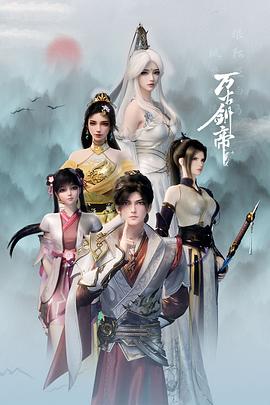 1.0更新至23集唐泽宗 张洋 萧蒿 唐钰 苏旖旎 陈新玥 小时候 丁莹莹 南田 艾琳猫 周杭 李丰道 冷调 二三 许子尧 张英 神遗大陆,百族争锋,武者为王。姜云曾是皇城天一武府武首,不想被夜天邪废掉武脉,天才变废人,不屈命运时,意外觉醒剑魂骨,在剑道之主剑妙禅的帮助下觉醒万古剑脉,成为凡尘域唯一的超凡剑修。原本打算潜心修行以
1.0更新至23集唐泽宗 张洋 萧蒿 唐钰 苏旖旎 陈新玥 小时候 丁莹莹 南田 艾琳猫 周杭 李丰道 冷调 二三 许子尧 张英 神遗大陆,百族争锋,武者为王。姜云曾是皇城天一武府武首,不想被夜天邪废掉武脉,天才变废人,不屈命运时,意外觉醒剑魂骨,在剑道之主剑妙禅的帮助下觉醒万古剑脉,成为凡尘域唯一的超凡剑修。原本打算潜心修行以 5.0更新至16集卢力峰 染音若蔡 星潮 唐策 郭浩然 金船 范馨源 王辅平 江月 赵袭 朱祎 万纯 赵秋融 李沁纹 朱婧 林强 王聪 孙鹏 贺文潇 刘琮 路扬 李昊甲 薄棠 刘彦汐 古域国丞相家的大小姐千云兮身怀异能,自幼被认为是不祥之人,被迫代嫁进夜王府。王爷夜幽冥见她赤诚善良,使出千层套路傲娇示好,千云兮则觉得王爷不怀好意,遂与其斗智斗勇起来。鸡飞狗跳的同居生活开始了。
5.0更新至16集卢力峰 染音若蔡 星潮 唐策 郭浩然 金船 范馨源 王辅平 江月 赵袭 朱祎 万纯 赵秋融 李沁纹 朱婧 林强 王聪 孙鹏 贺文潇 刘琮 路扬 李昊甲 薄棠 刘彦汐 古域国丞相家的大小姐千云兮身怀异能,自幼被认为是不祥之人,被迫代嫁进夜王府。王爷夜幽冥见她赤诚善良,使出千层套路傲娇示好,千云兮则觉得王爷不怀好意,遂与其斗智斗勇起来。鸡飞狗跳的同居生活开始了。 3.0更新至17集乔涛涛 孙露 唐钰 吕佳新 郜晓雨 李姬贤 天赋平平的宣起,原本只是个神通榜上没有排名的神通者,人生理想只是在这一方天地中,安全第一地苟到最后。然而一次外出,他恰好撞见倾城女帝和上古魔物的激战,遭受池鱼之殃。危急时刻,宣起竟然开启了“天秀”系统
3.0更新至17集乔涛涛 孙露 唐钰 吕佳新 郜晓雨 李姬贤 天赋平平的宣起,原本只是个神通榜上没有排名的神通者,人生理想只是在这一方天地中,安全第一地苟到最后。然而一次外出,他恰好撞见倾城女帝和上古魔物的激战,遭受池鱼之殃。危急时刻,宣起竟然开启了“天秀”系统
